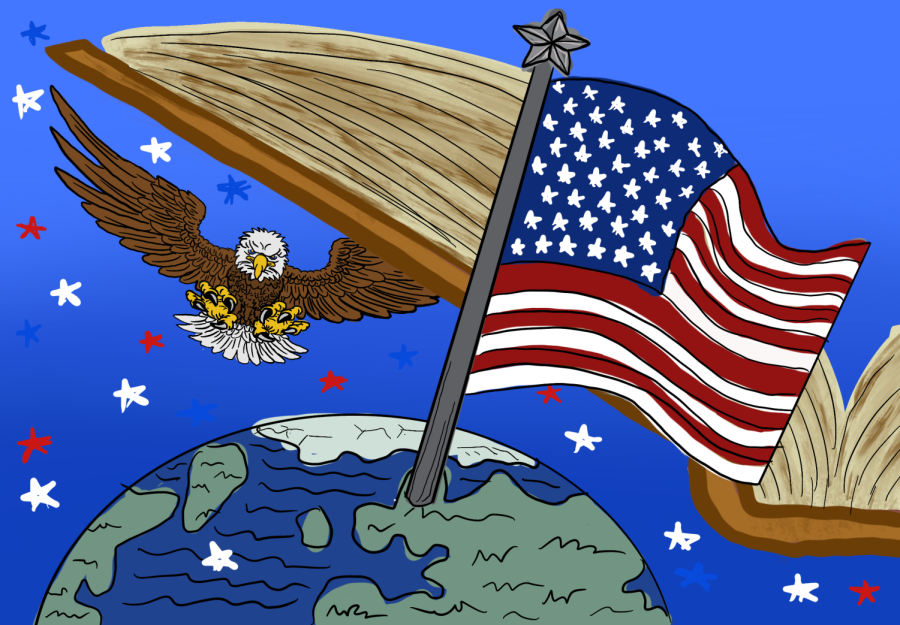Imperialism: America’s Double Standard
The United States’ influence, while not entirely harmful, often contributes to unequal economic relations.
April 20, 2022
The conflict in Ukraine has sparked conversations on a subject that has defined the modern age: imperialism.
While the annexation of neighboring territories brings to mind the most obvious forms of expansionism, brought to light by the brutal Russo-Ukrainian war, this understanding of imperialism is only one of many.
As the formal ties of imperialist powers to their subjects were severed after the end of WWII and colonial European control waned across much of Asia and Africa, decolonization became a common foreign policy objective across the globe. The retraction of imperial power by European nations arguably constitutes one of the greatest humanitarian successes in human history.
However, to say imperialism has been defeated grossly underestimates the ability of dead colonial powers to have a lasting influence on modern economic relations.
Countries like the United States, for example, despite the end of direct colonization, continue to benefit from and perpetuate imperialist relationships that mock the Western democratic ideals America claims to uphold.
Education on this subject is regrettably lacking in the United States, making it difficult for everyday Americans to understand the unequal systems of power maintained by Western foreign policy and recognize hypocrisy wherever it may be.
This ignorance, which is often willful, is vital for the continuation of imperialism. If Americans were to recognize the West as an actor with motives that are often beyond the propagandistic labels of spreading “freedom” and “democracy,” justifying intervention into foreign affairs would likely become more difficult. This would inevitably result in more responsible political action, and it would require America’s leaders to be held to a higher account.
The Iran-Contra Affairs, for instance, a scandal that involved former President Reagan avoiding congressional and public oversight in order to fund anti-communist groups abroad, demonstrates how public knowledge and disapproval of global imperialist efforts can bring these issues into the spotlight.
While the Reagan administration was still able to aid the Contras monetarily, the scandal that followed proves how a lack of public support can meaningfully affect harmful foreign policy.
Modern America, much like the European colonial empires of the past, inherently necessitates economic expansion, as internal production cannot match the needs of the consumer market. Where an increasing number of people need smartphones that contain gold from Peru and cobalt from the Congo, Western companies will continue to invest in foreign natural resources and labor.
In doing so, countries like the United States construct a system of compliance that no longer requires military intervention, but simply entangles the economic policy of developing countries with the interests of powerful Western corporations.
To successfully fulfill the capitalist market’s constant need for profit, the exploitation of workers in the Global South is unavoidable.
Direct European control over Africa largely ended only approximately 80 years ago.
Recognizing the United States as an informal empire, or a political entity that exercises influence over other groups without an associated claim of ownership, is an important step in recognizing certain hypocrisies that exist on behalf of the West. While it is absolutely necessary to decry Russian imperialism, the same attitude should also be applied introspectively.
This is not to say Western imperialism is comparable to the current Russian efforts in Ukraine — it’s not.
But it does mean the United States does not take its supposed commitment to anti-imperialism as seriously or consistently as one might expect.
This said, when conversations of anti-imperialism occur on cable news and senate floors, it might be worthwhile to take a look inward towards our own behavior as well. Our goal should be, above all else, the promotion of human rights, national sovereignty, and economic wellbeing for all peoples.
In Latin America alone, the United States has successfully intervened directly or indirectly to change foreign leadership 41 times since 1898. While there is debate over exactly why these interventions took place, many of these operations were likely carried out to favor American business interests.
The term banana republic, for instance, became popularized after several Latin American countries became beholden to the interests of companies like Standard Fruit (now known as Dole), which wielded immense political power and even supported a coup in Honduras, aided by the CIA, to remain in monopolistic control.
Even today, the CFA franc is still in use in several west African nations. While some argue this level of monetary control helps stabilize African economics, it is an undeniable relic of a colonial past that allows France to continue neo-colonial control from abroad.
Understanding the imbalance of power created between the Global South and its Western counterparts is necessary to recognize the remnants of European colonialism in the modern world, and our language must reflect this reality. Without precise language, we are intrinsically unable to comprehend the all too real power structures that exist between nations of varying levels of development.
This precise language is not meaninglessly chastising America for every foreign policy action it takes. Rather, we must keep in mind the geopolitical motives behind American diplomatic and economic relations, remaining open to different possibilities in this regard.
When politicians justify foreign conflicts through the veneer of anti-communist rhetoric or anti-terrorism, it’s important to think critically about the consequences of our actions abroad.
Russia’s invasion of Ukraine is unparalleled in its brutality, and there is no comparison to be made between it and the United States.
But the fact remains: US officials criticize Russia for its imperialistic ventures, while the West continues to maintain parasitic economic relationships established by former colonial empires.
The ideals of American democracy should not exist merely in a theatrical display, but should be fully realized for those beyond Western borders.







Chris Babinec • Mar 5, 2025 at 2:59 pm
Holy WOW! What an impressive and sharply written piece of journalism. This article expertly outlines issues, provides relevant historical context and is a thoughtful call to action.
Meredith • Apr 21, 2022 at 10:16 pm
This is Washington Post material and I mean that as a compliment. Well done!